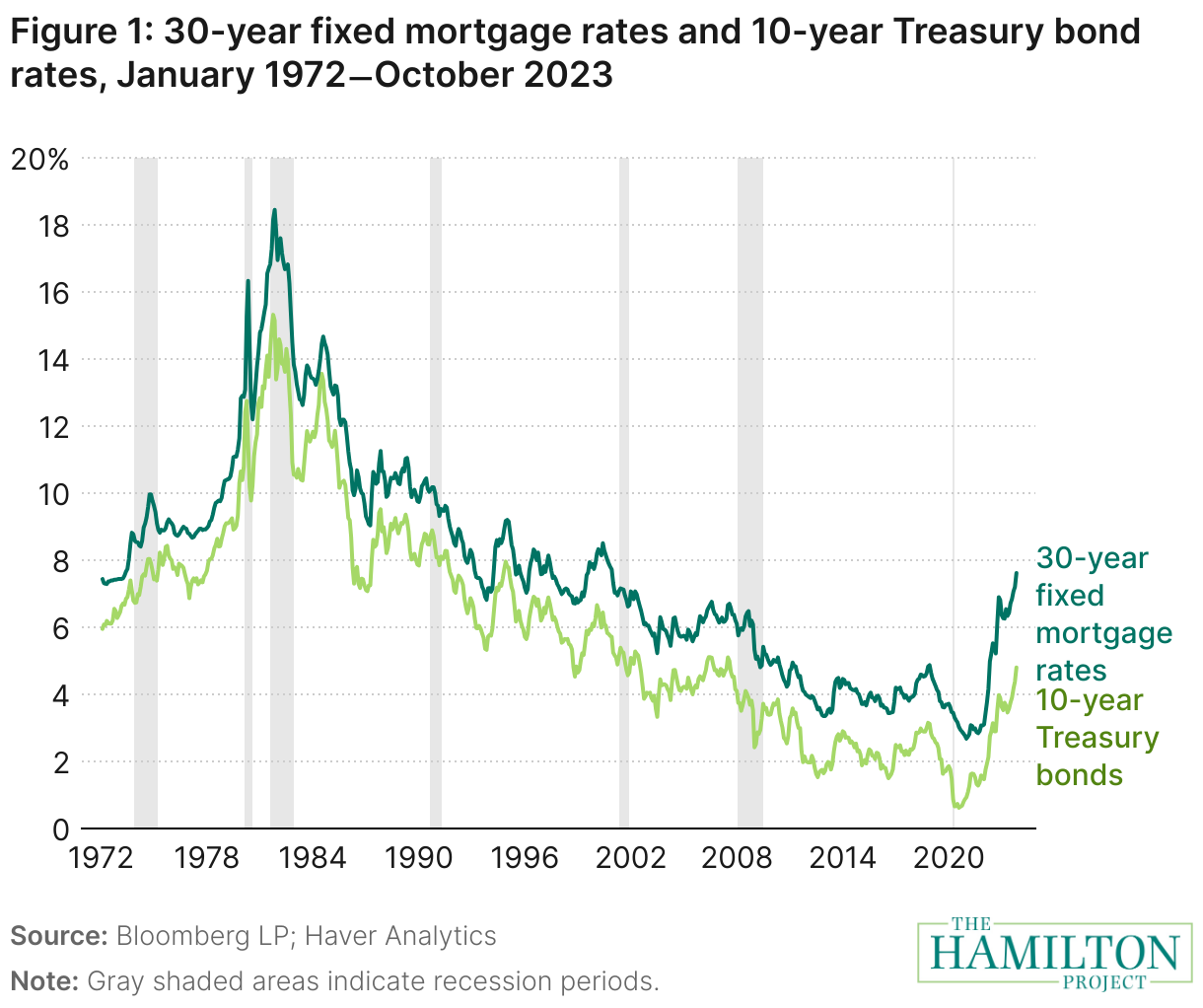How Does the 10-Year Treasury Yield Affect Mortgage Rates?
Where the 10-year Treasury yield moves, mortgage rates follow. Learn why they are connected and how they impact homebuyers.

Profit and prosper with the best of Kiplinger's advice on investing, taxes, retirement, personal finance and much more. Delivered daily. Enter your email in the box and click Sign Me Up.
You are now subscribed
Your newsletter sign-up was successful
Want to add more newsletters?
Many components contribute to the cost of your home. Along with price, the interest rate on your mortgage is an important consideration.
Currently, mortgage rates are among the lowest they have been in one year. The average rate on a 30-year mortgage is 6.09%, according to Freddie Mac.
And with the Fed recently cutting rates due to a weak job market, borrowing costs are expected to decrease. But does this apply to mortgages? While the Federal Reserve’s decisions can influence savings accounts and short-term lending rates, mortgage rates tend to follow the 10-year Treasury yield more closely.
From just $107.88 $24.99 for Kiplinger Personal Finance
Become a smarter, better informed investor. Subscribe from just $107.88 $24.99, plus get up to 4 Special Issues

Sign up for Kiplinger’s Free Newsletters
Profit and prosper with the best of expert advice on investing, taxes, retirement, personal finance and more - straight to your e-mail.
Profit and prosper with the best of expert advice - straight to your e-mail.
What's the 10-year Treasury yield?
The 10-year Treasury yield is the government's borrowing cost for a decade. As such, the Treasury rate influences everything from corporate bonds to mortgage rates.
You can see the correlation between mortgage rates and the 10-year Treasury bond in the chart below:

Why are mortgage rates tied to the 10-year Treasury yield? Since mortgages last longer than shorter-term lending options tied to the federal funds rate, they require a benchmark, where the duration reflects the average mortgage.
This is why the 10-year Treasury yield comes in, because it lasts about as long as the average homeowner has a mortgage.
If you're in the market for a new mortgage, use the tool below, powered by Bankrate, to compare and find some of today's rates:
How does the Treasury yield impact mortgage rates?
Recently, the 10-year Treasury yield increased to 4.26%. And when this yield rises, so can borrowing costs, specifically with mortgage interest rates.
With this in mind, who influences the Treasury yield? It's investors' expectations on short-term interest rates. When investors buy mortgage-backed securities, they're pledging money for a longer term than, say, a one-year Treasury bill since they're investing in a package of mortgage loans.
As such, elevated risk comes with longer-term investments.
It's why investors want a term premium to ensure they're earning a return on their investments. This premium influences the interest rate you'll pay on mortgages.
They use the following economic factors to guide their expectations:
- Monetary policies: When the Federal Reserve sets the federal funds rate, it's a benchmark for short-term rates. While it doesn't directly impact mortgage rates lenders assess, it can give investors an idea of future monetary policy, which they can use to influence investing decisions. And if investors lose confidence in the Fed, they might require higher returns, which could raise mortgage rates.
- Economic growth: When the economy does well, investors seek more promising opportunities such as equities. Meanwhile, when there's economic uncertainty, as there is now, with more tariffs being implemented and slower job growth, investors look for safer investments, which Treasury bonds offer.
- Inflation: When inflation becomes higher, investors seek higher interest rates.
What's the mortgage spread?

On top of this, there's a mortgage spread. It's the difference between your mortgage rate and the 10-year Treasury yield. Traditionally, it's been from 0.71 points to 1.4 points, according to Fannie Mae.
The spread consists of two parts: The primary-secondary spread and the secondary spread. The primary-secondary spread factors in mortgage origination fees, other lender costs and profits.
Meanwhile, the secondary mortgage spread is the difference between the mortgage-backed security (MBS), which investors purchase, and the 10-year Treasury rate.
The secondary spread covers some risks investors might face. To illustrate, an increased risk of prepayment can cause the spread to rise as investors won't maximize returns if the mortgage ends prematurely.
This can happen when homeowners shop around and find a lower interest rate; they might be inclined to take advantage of it through refinancing.
Why the 10-year Treasury yield matters for your mortgage rate
The 10-year Treasury yield plays a major role in determining mortgage rates, so when it drops, borrowing often becomes more affordable. However, economic factors such as inflation and investor confidence can still cause interest rates to fluctuate.
If you're considering buying or refinancing, keep an eye on the Treasury yield, but also compare lenders to find the best deal for your specific situation.
Related content
Profit and prosper with the best of Kiplinger's advice on investing, taxes, retirement, personal finance and much more. Delivered daily. Enter your email in the box and click Sign Me Up.

Sean is a veteran personal finance writer, with over 10 years of experience. He's written finance guides on insurance, savings, travel and more for CNET, Bankrate and GOBankingRates.
-
 4 High-End Experiences Worth the Splurge After 50
4 High-End Experiences Worth the Splurge After 50These curated date ideas provide the perfect backdrop for couples ready to enjoy the very best that the world has to offer.
-
 Health Care Stocks Have Sagged. Can You Bet on a Recovery?
Health Care Stocks Have Sagged. Can You Bet on a Recovery?The flagging health care sector has perked up a bit lately. Is it time to invest?
-
 Costco's Auto Program: Can Membership Pricing Really Save You Money on a Car?
Costco's Auto Program: Can Membership Pricing Really Save You Money on a Car?Costco's Auto Program can simplify the car-buying process with prearranged pricing and member perks. Here's what to know before you use it.
-
 What Is an Assumable Mortgage and Could It Save You Thousands?
What Is an Assumable Mortgage and Could It Save You Thousands?With mortgage rates still elevated, taking over a seller’s existing home loan could lower monthly payments — if the numbers work.
-
 How You Can Use the Financial Resource Built Into Your Home to Help With Your Long-Term Goals
How You Can Use the Financial Resource Built Into Your Home to Help With Your Long-Term GoalsHomeowners are increasingly using their home equity, through products like HELOCs and home equity loans, as a financial resource for managing debt, funding renovations and more.
-
 Want to Buy a Home With a Friend? Here's How to Prevent Legal Headaches
Want to Buy a Home With a Friend? Here's How to Prevent Legal HeadachesWith rising home prices leading more people to co-buy homes with friends, it's essential to have a co-tenancy agreement that clearly defines the deal.
-
 Counting on Real Estate to Fund Your Retirement? Avoid These 3 Costly Mistakes
Counting on Real Estate to Fund Your Retirement? Avoid These 3 Costly MistakesThe keys to successful real estate planning for retirees: Stop thinking of property income as a reliable paycheck, start planning for tax consequences and structure your assets early to maintain flexibility.
-
 We Retired at 62 With $6.1 Million. My Wife Wants to Make Large Donations, but I Want to Travel and Buy a Lake House.
We Retired at 62 With $6.1 Million. My Wife Wants to Make Large Donations, but I Want to Travel and Buy a Lake House.We are 62 and finally retired after decades of hard work. I see the lakehouse as an investment in our happiness.
-
 I'm an Opportunity Zone Pro: This Is How to Deliver Roth-Like Tax-Free Growth (Without Contribution Limits)
I'm an Opportunity Zone Pro: This Is How to Deliver Roth-Like Tax-Free Growth (Without Contribution Limits)Investors who combine Roth IRAs, the gold standard of tax-free savings, with qualified opportunity funds could enjoy decades of tax-free growth.
-
 I'm a Real Estate Investing Pro: This Is How to Use 1031 Exchanges to Scale Up Your Real Estate Empire
I'm a Real Estate Investing Pro: This Is How to Use 1031 Exchanges to Scale Up Your Real Estate EmpireSmall rental properties can be excellent investments, but you can use 1031 exchanges to transition to commercial real estate for bigger wealth-building.
-
 My Spouse and I Are Saving Money for a Down Payment on a House. Which Savings Account is the Best Way to Reach Our Goal?
My Spouse and I Are Saving Money for a Down Payment on a House. Which Savings Account is the Best Way to Reach Our Goal?Learn how timing matters when it comes to choosing the right account.